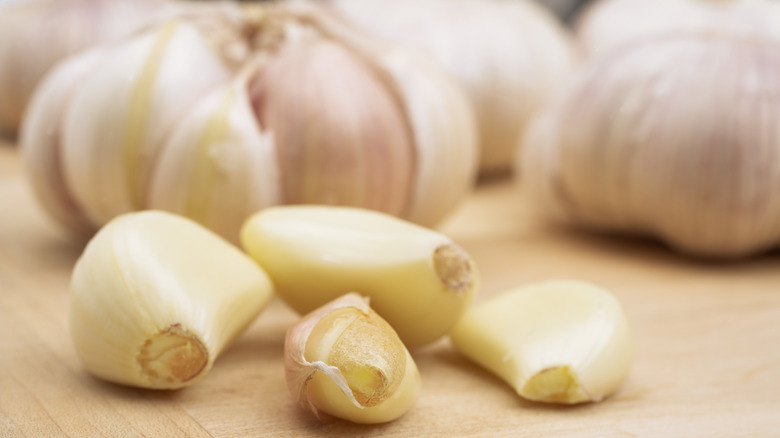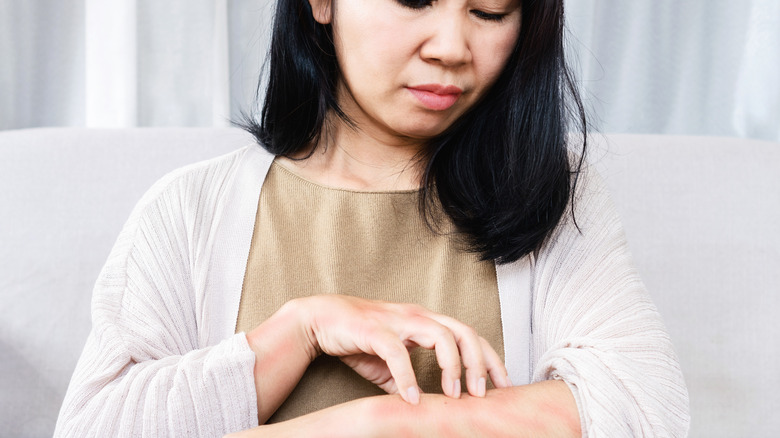Eating Garlic Has An Unexpected Effect On Your Early Death Risk
Garlic, although a healthy addition to curries, pasta, and other dishes, is infamous for causing bad breath. And, yes, it does this because of the way a certain sulfide found in this herb is absorbed in your system. Bad breath aside, however, garlic, native to Middle Asia, is a popular spice of choice if you're looking to boost your immune system. Whether you're trying to ward off a cold, a viral infection, or the flu, you can try munching on a few cloves of this soft, sweet, and buttery bulbous plant.
Turns out, the spice can also help you live longer and, more specifically, reduce your risk of early death. According to a 2019 study published in the journal Nutrients, habitual consumption of garlic was linked with a decrease in all-cause mortality risk. The researchers concluded that consuming garlic at least once a week was associated with the older adults in the study living longer when compared with those who consumed less.
They also found that garlic is a food that might help you prevent cancer, inflammatory conditions, and cardiovascular disease. Let's take a closeer look at what garlic does for your overall health.
How garlic can help prevent early death
Garlic has been associated with being anti-inflammatory, protecting against dementia and Alzheimer's disease, improving blood pressure and reducing cholesterol levels, warding off chronic disease, protecting your liver, and combating different types of cancer.
Early death risk after a heart disease diagnosis is a concern. In fact, it is thought to cause the death of one person every 33 seconds in the U.S., per the Centers for Disease Control and Prevention. Garlic has compounds that can help improve blood lipid profile, reduce systolic and diastolic blood pressures, and even help treat heart failure. According to a 2010 study published in the Journal of Agricultural and Food Chemistry, garlic oil was associated with protecting diabetic patients from cardiomyopathy (a condition that affects the heart muscle). Light to moderate garlic consumption was linked with a reduced risk of thickened carotid intima-media, an early indication of atherosclerosis, which can lead to cardiovascular disease, per a 2021 study published in Frontiers in Nutrition.
The older you are, the more you are at risk for early death if you're diagnosed with Alzheimer's disease, per the Alzheimer's Association, and garlic contains antioxidants that can help fight oxidative stress and cognitive decline. Garlic can also help prevent non-alcoholic fatty liver disease (NAFLD), per a 2019 study published in the European Journal of Endocrinology. End-stage cirrhosis, liver failure, and cancer are some of the life-threatening conditions associated with NAFLD. Allium herbs like garlic could prevent prostate cancer, while the organo-sulfur compounds in the spice can reduce brain cancer risk. Go on and add reduced lung cancer risk to the list too.
Things to keep in mind when consuming garlic
Despite its myriad health benefits, however, not everyone can tolerate garlic. Some might experience unexpected negative effects from the herb. If you're allergic to the stuff, for example, you could develop skin irritations including hives, swelling in your mouth, throat, and tongue, diarrhea, nausea, dizziness, difficulty breathing, and even life-threatening anaphylaxis.
People with bleeding disorders or on blood-thinning medications should also speak with a healthcare provider before consuming the herb because garlic can slow down blood clotting. You may want to tread with caution when it comes to certain gastrointestinal issues like acid reflux too as the spice is known to irritate some people's systems.
Raw garlic has more benefits but that doesn't mean you can't enjoy the stuff in your cooking. Aiming to consume about two cloves a day can be helpful for your overall health. If you're thinking about taking the supplement route, it's best you discuss this option with your doctor. Increasing your garlic intake too much, too soon, can have detrimental effects on some so it's always best to be careful. Handling the stuff might prove unpleasant for some too, according to registered dietician Laura Jeffers (via Cleveland Clinic). "You may also get a stinging feeling on the skin if you handle significant amounts of fresh and dried garlic," shared the expert. "To avoid garlic-induced skin lesions, wear kitchen gloves."
If this article was interesting, you may also want to read about a type of fruit you can add to your diet to reduce your risk of early death.



